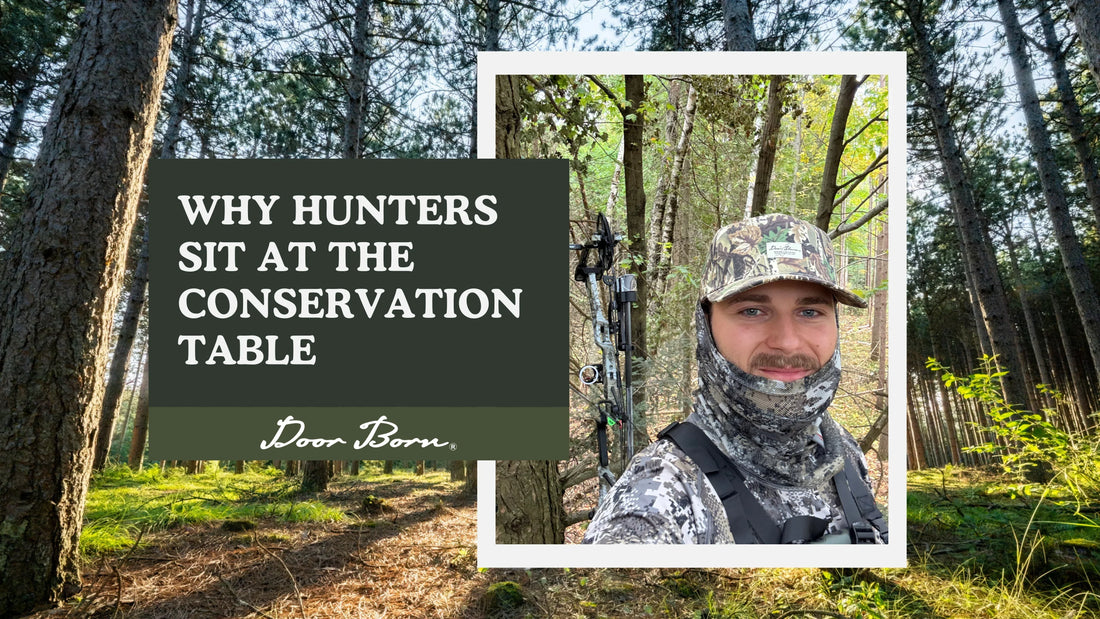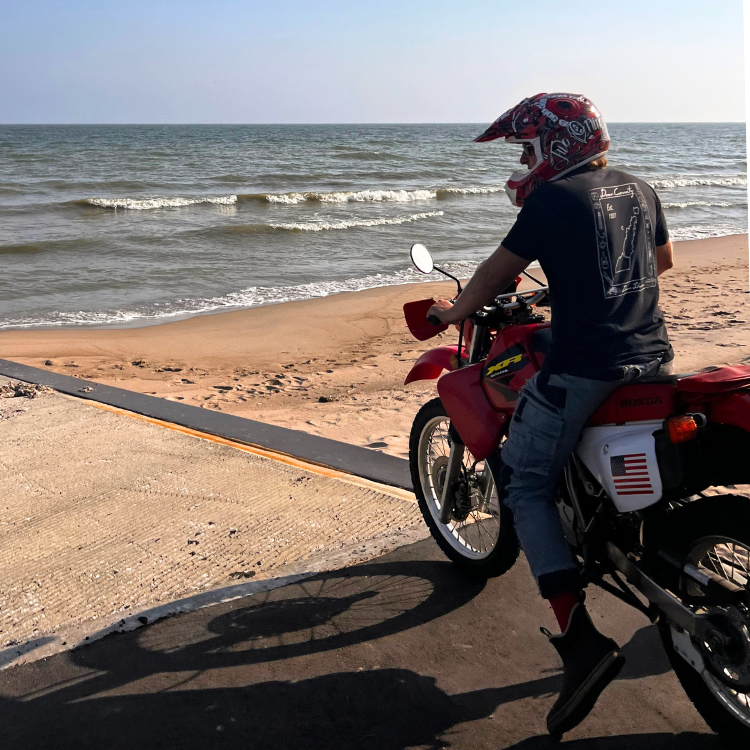
Why Hunters Sit at the Conservation Table
Share
By Rex Meikle
I’m a hunter, and I say that proudly. If my statement evoked a sense of disconnect, an eye roll, or even an “ick,” I encourage you to set your preconceived notions aside and read through this article with an open mind. Hunters have largely been othered by many in the conservation space. We’ve been made out to be the barbaric, uneducated, deplorable threat to our shared wild spaces. However, we are not. We are your brothers, sisters, neighbors, and friends. We are active participants on our shared public lands and the bloodline of financial support that keeps them alive.
I still remember the first time I stumbled across Door County Land Trust’s Hunting Program Page. With a sigh of relief and an approving smile, I muttered, “They get it!” I was thrilled to see that they stated, “Hunters play an important role as conservation partners with the Door County Land Trust …” If you’re still apprehensive about accepting and supporting hunters as your partners in conservation, please continue reading.
Why Hunters Matter to Conservation
Hunters are not a threat to conservation. We are one of the strongest pillars. The system that funds wildlife management in our country was built by hunters who understood that if you take from the land, you must also give back. Every purchase of firearms, archery equipment, or ammunition is taxed through the Pittman–Robertson Act, generating around $990 million in 2024 for habitat restoration, public access, and species recovery programs. That figure does not include dollars generated from the Dingell–Johnson Sport Fish Restoration Act, hunting and fishing licenses, stamps, or personal and business donations toward conservation. Billions of dollars are generated yearly in our country by hunters and sportsmen.
But it isn’t just about financial contributions. Hunters spend a significant amount of time walking, sitting, observing, and documenting what they see. They notice illnesses in animals, encroachment on public spaces, and invasive takeovers. They report these things, volunteer for cleanups, and educate others on current conditions. Just this year, I reported the suspicious death of a young whitetail buck and made a follow-up report on a yellow perch I found with blue coloration in its mouth and along its eggs. You have to be an active participant to notice these things and the data collected in the field is critical for conservation. Hunters aren’t standing on the sidelines. We’re out there paying attention and actively contributing.
Hunting reduces winter mortality, limits the spread of disease, and helps prevent overbrowsing on native flora. As humans, we are and always have been a part of the natural world. We have always hunted and participated in the food chain. In today’s stamped, sterilized, and plastic-wrapped world, harvesting your own protein might seem barbaric to some. In truth, it is deeply natural and rooted in our biology as living creatures who belong to the land, not apart from it.
My Relationship with These Lands
My relationship with nature runs deep. I was fortunate to grow up in the country on a large portion of land once owned and cared for by my great-grandfather, a true steward of the property. He was a sharecropper with an 8th grade education who knew every plant, animal, and tree on the property. He trapped and sold fur as a child to raise money so he could buy his siblings Christmas presents each year. He and my great grandma raised their 6 children through the Great Depression. And he lived alongside the land until the age of 97. He left a lasting impression on our family, and on the land. I walk beneath the canopy of red pines, black walnuts, and maples he planted as saplings generations ago. He made many contributions to promote the ecology and plan for the future of the property. He even let responsible young hunters enjoy the splendor of his property throughout the years. He was and still is my hero.
Not every family has generational property they can care for and pass down, but everyone living in or visiting Door County can enjoy the vast array of public properties cared for and protected by Door County Land Trust. I have a firm belief that in order to care deeply about land conservation and stewardship, one must first fall in love with the natural world. For this to happen, access to public spaces and various recreational opportunities are essential. I fell in love with nature through hunting and fishing, but others may find this reverence for the land through walking their dog, crosscountry skiing, or birding. What brings you to the land is less important than your arrival and the passion for public places.
How Hunting Functions as a Conservation Tool
Hunting was not my first foray in the outdoor space. I loved fishing first and neither of my parents hunted. In middle school I wanted to get into waterfowl hunting, but was not interested in hunting deer as I thought it was unethical and malice. It was in Hunter's Safety as a boy that I learned about the ecological term carrying capacity, or the natural limit to how much life can be sustained within a specific environment. We had a conservation officer visit our class and share how that particular year we had low harvest numbers of deer paired with a harsh winter which consequently led to many deer in Door County dying of malnutrition and starvation. He described how several deer were found dead with their stomachs full of low calorie foods like pine and spruce needles. I still remember that day. It shook me of my emotional understanding of hunting and conservation and led me to the realization that data driven active management was the most ethical and sustainable approach.
From that point forward, I stopped seeing hunting as something that took from the land and started seeing it as active participation in the natural world to sustain the health and longevity. I began to understand that balance doesn’t happen on its own. It requires people who pay attention and make hard choices for the health of the whole. Hunting became less about taking an animal and more about participating in the cycle of stewardship that keeps wild places diverse and thriving.
Why Door County Land Trust Matters
Door County Land Trust matters for many reasons. The organization's multifaceted approach to conservation, including land acquisition, conservation easements, invasive species mitigation, and the creation of public recreational opportunities, is remarkable. Most impressive of all is the scale of their protection, surpassing 10,000 acres, and the ecological diversity of the lands they manage. Do yourself a favor and visit one of their many properties if you have not, and if you’re a habitual DCLT visitor, discover a new property next time you visit!
Our Shared Ground
At the end of the day, we all want the same thing. If I love hunting deer and turkeys and you love hiking on trails, we should celebrate our similarities instead of being divided by our differences. When the goal is land conservation, stewardship, and public access, we’re on the same page, and that’s what matters most. You don’t have to be a hunter, but you should welcome them and their perspective. We can accomplish a lot when everyone who shares a reverence for nature comes together around the shared goal of protecting our public lands.
Thank you, Door County Land Trust, for giving me the opportunity, as a hunter, to share why I appreciate your conservation model. I hope I’ve helped shed some light on why hunters are valued participants in supporting conservation efforts. I’m proud to be a business member of Door County Land Trust through my Great Lakes outdoor lifestyle brand, Door Born. Please consider making a tax-deductible contribution to Door County Land Trust this year and share the beauty of one of their many protected properties with someone new.
If you liked this article help support us by following on Instagram, Facebook, Youtube, or by shopping from our store.



